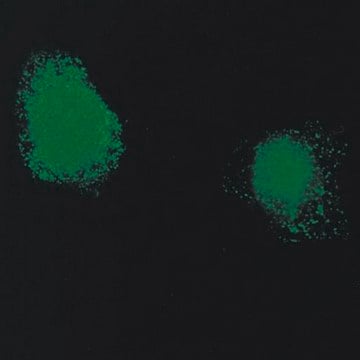General description
We are committed to bringing you greener alternative products, which adhere to one or more of The 12 Principles of Green Chemistry.This antibody is Preservative-free, produced without the harm or sacrifice of animals and exceptionally stable to allow for ambient shipping and storage if needed and thus aligns with "Waste Prevention", "Designing Safer Chemicals" and "Design for Energy Efficiency".
Click here for more information.
ZooMAb® antibodies represent an entirely new generation of recombinant monoclonal antibodies.Each ZooMAb® antibody is manufactured using our proprietary recombinant expression system, purified to homogeneity, and precisely dispensed to produce robust and highly reproducible lot-to-lot consistency. Only top-performing clones are released for use by researchers. Each antibody is validated for high specificity and affinity across multiple applications, including its most commonly used application. ZooMAb® antibodies are reliably available and ready to ship when you need them.
Specificity
Clone 20/11 is a ZooMAb® mouse recombinant monoclonal antibody that detects Adenovirus infected human cells.
Immunogen
Adenovirus type 3.
Application
Quality Control Testing
Evaluated by Western Blotting in A549 cells infected with Adenovirus.
Immunocytochemistry Analysis (ICC): A 1:100 dilution of this antibody detected Adenovirus in A549 cells infected with Adenovirus type 3.
Tested applications
Flow Cytometry Analysis: 0.1 μg from a representative lot detected Adenovirus in one million A549 cells infected with adenovirus.
Immunohistochemistry (Paraffin) Analysis: A 1:1,000 dilution from a representative lot detected Adenovirus in Formalin Fixed Paraffin Embedded (FFPE) section of a pellet of Adenovirus infected A549 cells.
Note: Actual optimal working dilutions must be determined by end user as specimens, and experimental conditions may vary with the end user
Target description
Adenoviruses are large (65-80 nm), non-enveloped viruses containing a dsDNA genome. They typically cause mild infections involving the upper or lower respiratory tract, gastrointestinal (GI) tract, or conjunctiva. However, rare manifestations of adenovirus infections may include hemorrhagic cystitis, hepatitis, hemorrhagic colitis, pancreatitis, nephritis, or encephalitis. They are also used as gene delivery vectors. They also have the ability to trigger cell proliferation by interfering with host cellular anti-oncogenes. Human adenovirus type 3 (HAdV-3) is one of the most prevalent genotypes among adenoviruses responsible for acute respiratory infections. The principal component of adenovirus is the homotrimeric hexon and there are 240 on the faces and edges of the capsid with the pentons consisting of the penton bases and extended fibers on the 12 fivefold apices. The size of the hexon molecule can vary with the serotype. The base of each hexon molecule has one loop and two eight-stranded jelly rolls that are important for interacting with neighboring capsomeres. Other so-called minor components: IIIa, VI, VIII and IX are also associated with the capsid. There are six other structural components situated in the virus core, of which five are associated with the double stranded DNA genome and the remaining component is the 23K virion protease that plays a vital role in the assembly of the virion. This ZooMAbZooMAb® recombinant monoclonal antibody, generated by our propriety technology, offers significantly enhanced specificity, affinity, reproducibility, and stability over conventional monoclonals. (Ref.: Duan, Y., et al. (2021). Front. Microbiol. 12; 688661).
Physical form
Purified recombinant mouse monoclonal antibody IgG, lyophilized in PBS with 5% Trehalose, normal appearance a coarse or translucent resin. The PBS/trehalose components in the ZooMAb formulation can have the appearance of a semi-solid (bead like gel) after lyophilization. This is a normal phenomenon. Please follow the recommended reconstitution procedure in the data sheet to dissolve the semi-solid, bead-like, gel-appearing material. The resulting antibody solution is completely stable and functional as proven by full functional testing. Contains no biocide or preservatives, such as azide, or any animal by-products. Larger pack sizes provided as multiples of 25 μL.
Reconstitution
300 μg/mL after reconstitution at 25 μL per vial. Please refer to guidance on suggested starting dilutions and/or titers per application and sample type.
Storage and Stability
Recommend storage of lyophilized product at 2-8°C; Before reconstitution, micro-centrifuge vials briefly to spin down material to bottom of the vial; Reconstitute each vial by adding 25 μL of filtered lab grade water or PBS; Reconstituted antibodies can be stored at 2-8°C, or -20°C for long term storage. Avoid repeated freeze-thaws.
Legal Information
ZooMAb is a registered trademark of Merck KGaA, Darmstadt, Germany
Disclaimer
Unless otherwise stated in our catalog or other company documentation accompanying the product(s), our products are intended for research use only and are not to be used for any other purpose, which includes but is not limited to, unauthorized commercial uses, in vitro diagnostic uses, ex vivo or in vivo therapeutic uses or any type of consumption or application to humans or animals.










